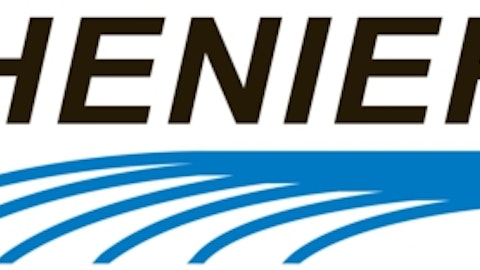
The perfect price storm
The energy assets of the U.S. are not prime examples of sustainability, from either an economic or environmental perspective. But a new April estimate from the Potential Gas Committee puts domestic natural gas reserves at a whopping 2,384 trillion cubic feet. That’s 22% higher than 2010 estimates and, at current consumption levels, enough energy to power the U.S. for another 105 years.
But if this latest report from the DoE is any evidence, America isn’t keeping its gas to itself. After approving Cheniere Energy, Inc. (NYSEMKT:LNG)‘s Sabine Pass Terminal in 2011, the department gave the green light to a new $10 billion Freeport LNG project.
While natural gas exports could increase U.S. energy independence, reduce our trade deficit, and improve our overall economy, several stable utilities could feel a price squeeze like never before.
In the past year, natural gas has jumped 50% in price, and exports could keep those numbers headed higher. By opening up domestic gas supplies to a larger international audience, demand could balloon while supplies are sucked lower and lower.

Henry Hub Natural Gas Spot Price data by YCharts
We’ve already seen some evidence of how higher natural gas prices hit utilities hard this past quarter. Exelon Corporation (NYSE:EXC) took a $235 million one-time hit from bad hedges, while PPL Corporation (NYSE:PPL)‘s unregulated earnings dropped more than 50% from natural gas’ unnatural rise.
From a long-term perspective, utilities with major domestic natural gas assets could lose major cost competitiveness. While companies like Dominion Energy or Sempra Energy (NYSE:SRE) are poised to export, nationally focused natural gas utilities won’t be so financially fortunate.
Atlantic Power Corp (NYSE:AT) currently relies on natural gas for 58% of its generation capacity, and is focusing its future on natural gas and renewables as its energies of choice.

Source: Atlantic Power 10-K
Duke Energy Corp (NYSE:DUK) isn’t doing too well, either. The company uses natural gas and fuel oil for 37% of its regulated generation, and 42% for its unregulated division.

Source: Duke Energy 2012 Sustainability Report
TECO Energy, Inc. (NYSE:TE) is known for its coal-centric capacity and ownership of Appalachian mines, but the company relies on natural gas for 39% of its overall generation.
Can these utilities come back?
Although Atlantic Power Corp (NYSE:AT), Duke Energy Corp (NYSE:DUK), and TECO Energy, Inc. (NYSE:TE) each have sizable natural gas assets, there are two ways to avoid future natural gas nightmares: either by diversifying energy sources or jumping on the LNG train.
Duke Energy Corp (NYSE:DUK) and TECO Energy, Inc. (NYSE:TE) already have significant assets in energies that will be increasingly cost competitive as gas prices head higher. Duke has a sizable stake in coal and nuclear, while TECO Energy, Inc. (NYSE:TE)continues to cling to cost-effective coal. Atlantic Power Corp (NYSE:AT) has its eye on more natural gas, but it might be able to steer clear by ramping up renewables.
If any of these companies can arrange for their natural gas assets to be exported, they’ll reap the same rewards that Dominion and Sempra Energy (NYSE:SRE) hope to win.
Great exportations?
Natural gas export policies are far from finished, and a murky mix of politics, prices, and profits will ultimately decide whether this opportunity will take off. Even as exports ramp up, the DoE has the ultimate call on what’s “consistent with the public interest”.
As a member of the public interest, do you think the U.S. should increase natural gas exports? Comment below!
The article 3 Losers From Natural Gas Exports originally appeared on Fool.com.
Motley Fool contributor Justin Loiseau has no position in any stocks mentioned. The Motley Fool recommends Dominion Resources (NYSE:D) and Exelon.
Copyright © 1995 – 2013 The Motley Fool, LLC. All rights reserved. The Motley Fool has a disclosure policy.



